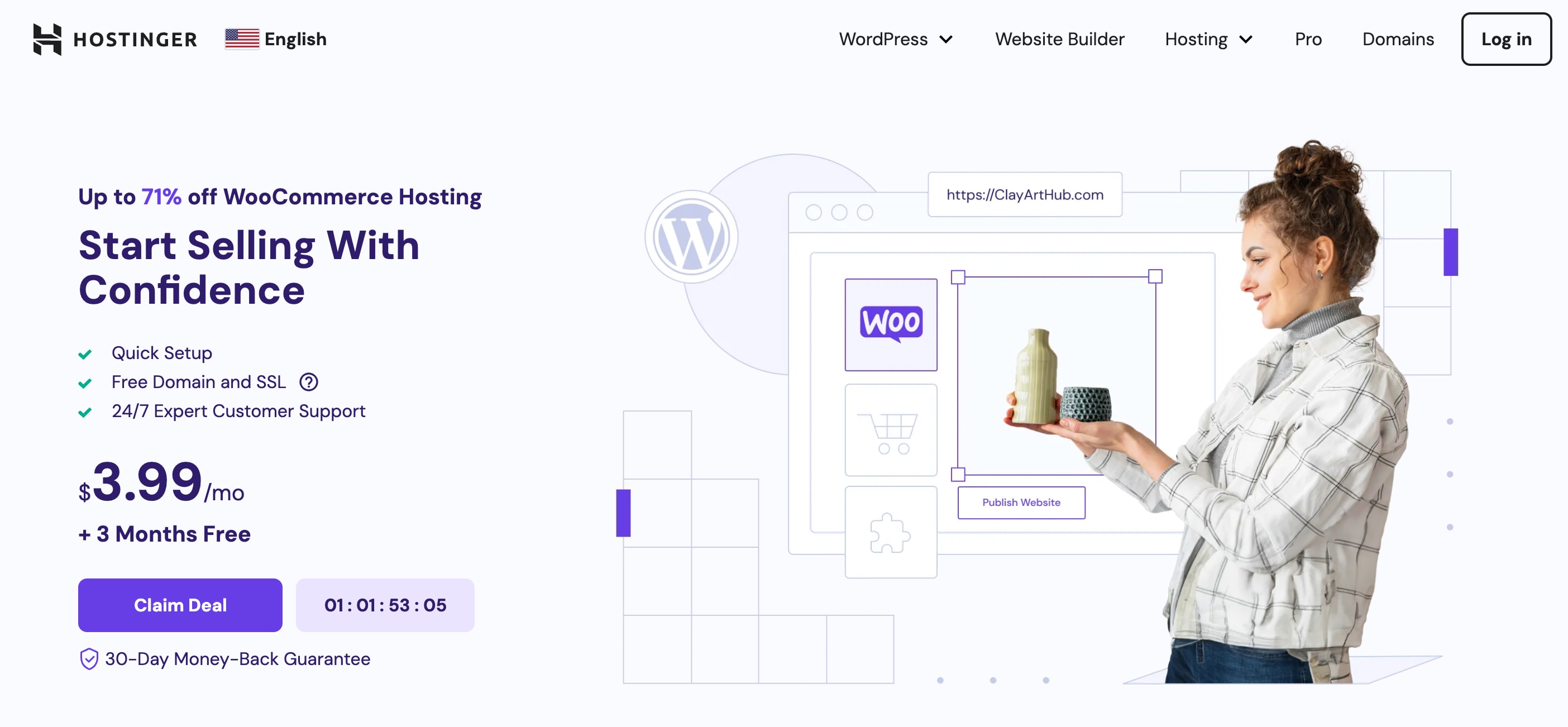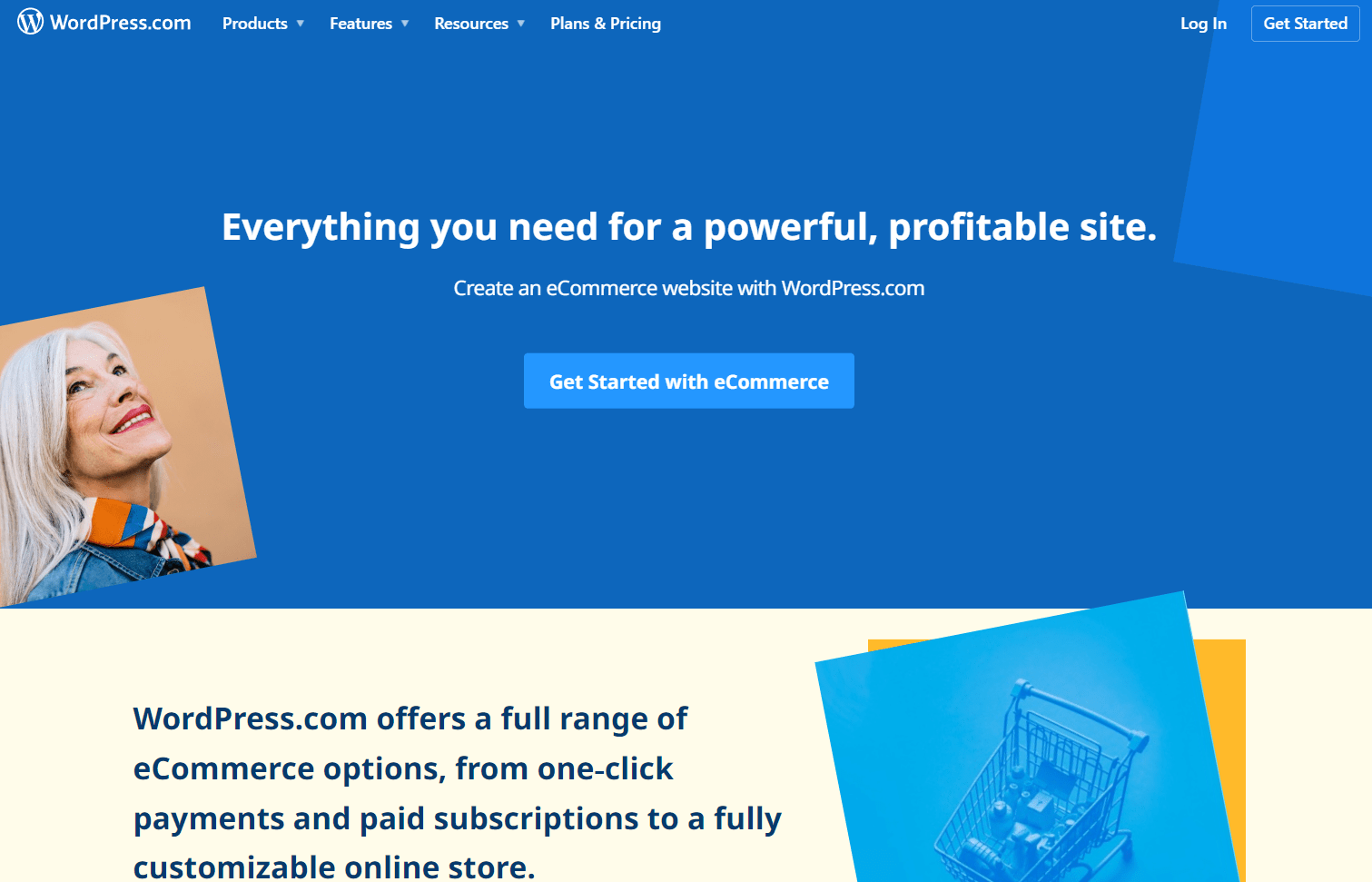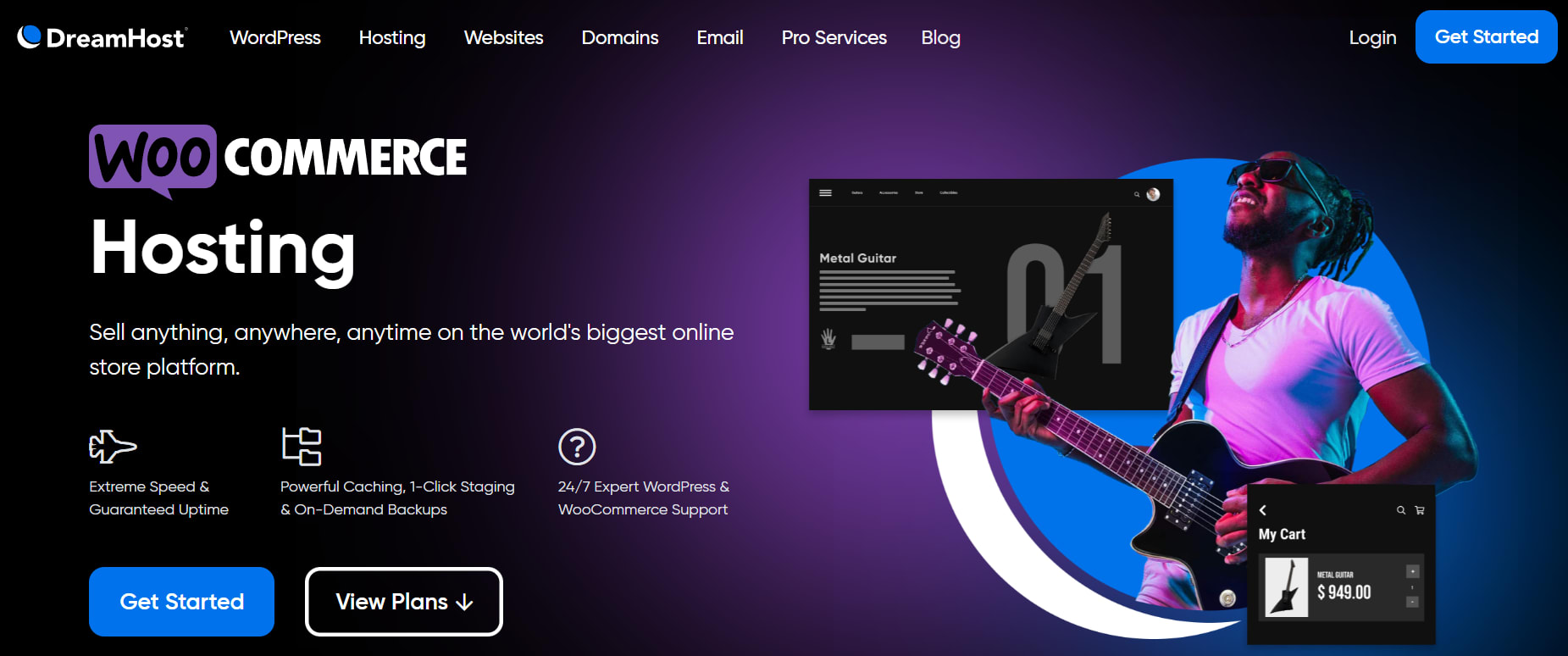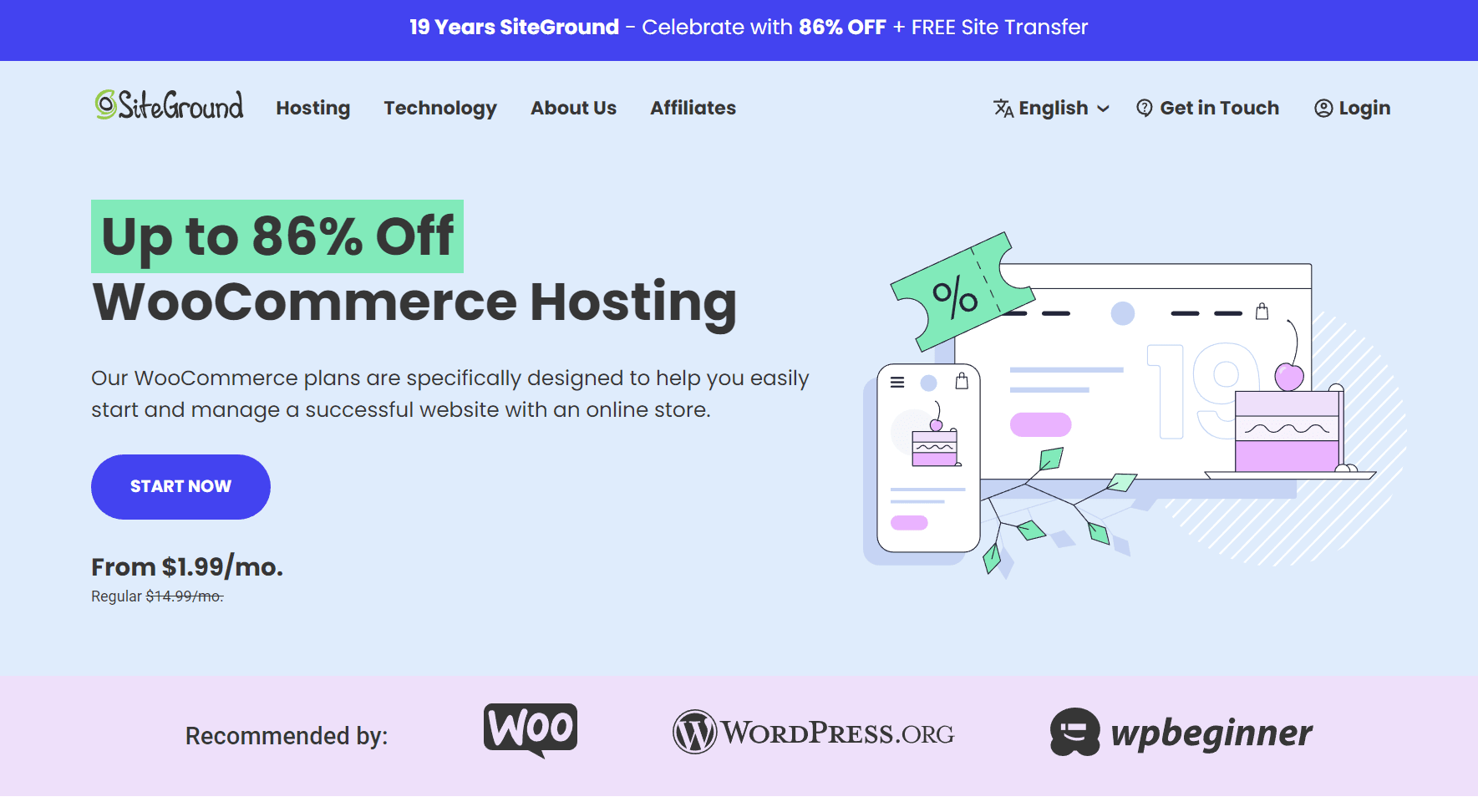10 Best Ecommerce Hosting Services for 2024
Plenty of options exist for ecommerce hosting. But too much choice can also be confusing. We break down the top 10 ecommerce hosts for your online store.
 June 6, 2024
June 6, 2024 16 minute reading
16 minute reading
So, you’ve decided to start your own online store. Hooray! But with so many ecommerce hosting options, how can you choose the best one for you?
Picking the wrong ecommerce host can result in frustration or a poorly functioning website.
Fortunately, the choice is pretty simple if you know what to look for.
What is ecommerce hosting? And how does it compare to an ecommerce platform?
Hosting refers to where you store the code files necessary to make your ecommerce website work. The code files themselves are called the ecommerce platform.
The best way to picture this is to imagine a car in a garage. The car is the platform, and the garage is the host. You can put any vehicle model in your garage—BMW, Mustang, Chevrolet, Ford, Mercedes, Fiat.
The platform is your ecommerce vehicle. It provides the functionality through programming code that enables typical ecommerce features such as:
Displaying products
Uploading products to sell and changing their descriptions and prices
Accepting credit card payments
Sending transactional emails
Shopping cart functionality
Login and user accounts
The host is where those code files are stored.
If you’d like to know which ecommerce platforms are the best, check out our guide on the best ecommerce platforms.
The 10 best ecommerce hosting solutions
OK, that was the tricky part. Let’s look at the top ecommerce hosts for 2024!
1. Hostinger

Type: Ecommerce host only.
Best suited for: Self-hosted PrestaShop or WooCommerce solutions.
Description: You can set up and host any self-hosted ecommerce solution on Hostinger, such as WooCommerce, PrestaShop, and OpenCart. But the reason it made our list is because of the two managed solutions it offers that let you set up your ecommerce hosting with just a few clicks:
Managed WordPress WooCommerce hosting
PrestaShop hosting
Managed hosting means their team ensures their website servers operate at maximum performance.
Like all WordPress installations, you’ll need to maintain the site, and you might want to find a web developer to help you do that.
Pros and cons: All the ecommerce solutions offered by Hostinger are self-hosted, meaning you can move them to any other host if you want, with minimal work. Its setup procedure for PrestaShop and WordPress with WooCommerce is intuitive.
Hostinger’s pricing is spectacularly competitive, although it doesn’t include some of the advanced caching and content delivery functions that the other WooCommerce hosts on our list have.
Pricing: Hostinger is, by far, the most cost-effective managed WordPress host on our list. Its WooCommerce pricing starts at $3.99/month and goes up to $29.99/month. Its plans include server-level caching, tons of storage space, and free SSL.
Hostinger’s PrestaShop hosting costs between $19.99/month and $54.99/month.
Additionally, Hostinger offers a Referral Program, where you can join and earn a 20% commission for all new yearly hosting plans. Your referrals will receive a 20% discount as well.
2. WordPress.com with WooCommerce

Type: Ecommerce platform and host. But you can use a different host if you install self-hosted WordPress on another host.
Best suited for: People with zero design or web development skills.
Description: Most people know WordPress as a free, downloadable blogging platform with thousands of plug-ins that can be added to it to boost functionality.
WordPress.com is the paid, managed version of WordPress. That means you don’t need to download any files. You simply sign up for one of the monthly packages and the WordPress team takes care of all hosting and updates.
When you sign up for the Commerce hosting package, your site comes pre-configured with ecommerce functionality through WordPress’s official ecommerce plug-in, WooCommerce.
The Business package is slightly cheaper and lets you install WooCommerce yourself. You also need to perform your own updates on that package.
Pros and cons: WordPress is an excellent choice for any website, whether ecommerce or not. It’s flexible, well-maintained, and powers up much of the web.
Although WordPress.com offers excellent flexibility, it’s not the same as installing your own version of WordPress. WordPress.com blocks several incompatible plug-ins, including the highly popular (and effective) W3 Total Cache. There’s no guarantee that WordPress.com won’t block other plug-ins in the future.
Exporting a WordPress.com site is no easy task compared to exporting a self-hosted WordPress site. WordPress.com does offer an “export” function, but this only gives you the content in text format. It contains no images or theme files.
If you want to go with WordPress, trying one of the self-hosted versions below might be better. You can always buy WooCommerce development services from Fiverr to set up a self-hosted WordPress ecommerce site if you need some help.
Pricing: The WordPress Business package, at $25/month, offers ecommerce features if you install plug-ins. You can hire a Fiverr WooCommerce freelancer to help you with that, if needed.
At $45/month, the Commerce package is entirely pre-configured with ecommerce functionality, and the WordPress team handles updates.
3. Shopify

Type: Ecommerce platform and host. You must host with Shopify to use the platform.
Best suited for: People with zero design or web development skills.
Description: Shopify is a dedicated ecommerce platform and hosting service. If you use Shopify, you must host with it and can’t take your ecommerce store anywhere else.
Shopify is the world’s most widely used ecommerce platform, holding 26% of the ecommerce market share. Part of its advantage might be attributable to it being the first easy-to-use, easy-to-set-up ecommerce platform on the market: Shopify launched in 2006, far earlier than any other players on this list. For example, Squarespace launched in 2003, but its ecommerce solution wasn’t released until 10 years later.
Jason Turnquist, Co-Founder and CEO of web development company Fyresite, tells Fiverr, “Shopify is by far the most robust ecommerce platform on the market. Their integrations are seamless and fairly easy to navigate. Shopify’s back end interface is comfortable but powerful and gives great previews of your analytics, listings, and sales, and everything merchants could possibly need is only a few clicks away. They also have a huge app store, high-end themes to build from, and reduced friction at checkout with the incorporation of Shop Pay.”
Pros and cons: Setting up an online store is a breeze on Shopify. It’s geared to get you selling fast, with a beautiful storefront regardless of your design experience. In that respect, it’s an excellent choice.
Shopify also lets you add features to its store through an app store containing more than 8,000 apps.
Unfortunately, you’re locked into the platform if you use it. Transferring your site and all its products to another host or platform in the future is no easy task. If Shopify decided to raise its prices, you’d have to accept the change or close your store.
Another con of Shopify is its lack of drag-and-drop design features, which Wix does a great job of offering. Shopify also only has a handful of free themes to use, otherwise you’ll have to pay for a premium theme, some of which cost $300.
Pricing: Shopify’s plans start at $29/month and go up to $299/month. Every plan also charges transaction fees, although the higher-priced plans reduce those fees.
Shopify offers a free trial while you set up your store, but you’ll need to start paying to sell products. Unfortunately, only the advanced plan gives you real-time shipping rates for FedEx, UPS, and the US Postal Service (USPS).
All plans give you discounts for shipping with DHL, Sendle, USPS, UPS, and Canada Post, because Shopify has partnerships in place with these companies.
Setup your Shopify website with these experts
4. BigCommerce

Type: Ecommerce platform and host.
Best suited for: People with no development experience.
Description: This major player in the ecommerce sector announced in January 2023 that it was shifting focus to enterprise ecommerce. But it still very much serves SMBs, and its pricing is not much different from Shopify’s—except that it doesn’t charge transaction fees.
BigCommerce has been one of the steady players in the ecommerce sector for many years. It’s a fully hosted platform packed with features, including SEO and marketing features.
Some of its marketing features include:
Automatically adding products to Google Shopping
Integration with MailChimp and Hubspot for email marketing
Loyalty programs
Social sharing
BigCommerce’s app store has over 700 apps to add features to your website. It also has over a hundred themes you can choose from. Unfortunately, only 12 of those themes are free. Paid themes range from $150 to $300. But you can also buy cheaper themes from places like ThemeForest and import them into BigCommerce.
Pros and cons: BigCommerce upgraded its website builder in 2020, and the new experience is truly excellent. It implemented a drag-and-drop designer that makes it easy to customize a site and add new pages.
It also charges zero transaction fees.
BigCommerce’s revenue has grown steadily over the past few years, but its market share remains small compared to Shopify and WooCommerce, which both appeal immensely to small businesses. Its recent decision to focus on enterprise ecommerce solutions could mean less attention paid to its SMB features moving forward.
Pricing: BigCommerce’s pricing is exactly the same as Shopify’s, starting at $29/month and going up to $299/month. Unlike Shopify and Wix, it charges zero transaction fees, which could significantly affect monthly costs for stores that sell many products.
5. Wix Ecommerce

Type: Ecommerce platform and host. You must host with Wix to use the platform.
Best suited for: People with zero design or web development skills.
Description: Wix began as a website builder in 2006 but launched its extended ecommerce features in June 2020. One of the primary benefits of running a Wix Store is how easy it is to design one.
Wix provides a fully customizable drag-and-drop interface for designing your web store. It also has hundreds of free templates to get you started. Just make sure to check if those templates work on a mobile device, although it’s easy to modify the mobile version using Wix’s visual editor.
These easy-to-use features have propelled Wix Stores to become the third-most widely used ecommerce platform on the internet, with almost 9% market share, behind only Shopify and WooCommerce.
Pros and cons: Wix’s successful history as a website builder informs its ecommerce solution. It’s straightforward to design beautiful stores and there are tons of templates to choose from.
Wix is an excellent contender in the ecommerce space, but has some limitations. For example, it only offers real-time shipping pricing for USPS (United States Postal Service), putting it immediately at a disadvantage compared to Shopify.
Like all ecommerce platforms that double as hosts, hosting with Wix locks you in and makes it extremely difficult to move to a different provider in the future. It can be done, but you’ll probably have to buy website migration services because it involves several technical steps.
Pricing: You must upgrade to one of Wix’s business plans to enable the ecommerce features. Monthly pricing ranges from $20 to $40, but keep in mind that Wix offers no discounts for transaction fees in the higher packages, so this could become a problem if you sell many products.
6. Squarespace

Type: Ecommerce platform and host. You must host with Squarespace to use the platform.
Best suited for: People with zero design or web development skills.
Description: Squarespace is a DIY web design and development platform that doubles as a host. Its business and commerce packages let you plug-and-play ecommerce features right out of the box.
Squarespace is known for its user-friendliness and simplicity. Creating a professional website with no previous web design or development knowledge is straightforward.
Pros and cons: Squarespace is definitely for people with zero development skills. With so many skilled web development freelancers on Fiverr, that argument has less weight today than it did a few years ago.
The biggest con of Squarespace is that it locks you into its platform and hosting solution. If you ever wanted to scale beyond Squarespace, you could technically redirect all the old Squarespace pages to a new site. But such a task would be complex to achieve. Use Squarespace only if you’re confident you’ll never move away from it.
Pricing: Squarespace pricing with ecommerce starts at $23/month and goes up to $49/month. Only the most expensive package offers:
Subscriptions
Abandoned cart recovery (crucial for a successful ecommerce site)
Free shipping for orders meeting specific thresholds
Full discount functionality
7. Bluehost—WooCommerce hosting

Type: Ecommerce host.
Best suited for: Self-hosted WordPress solutions.
Description: Bluehost is a WordPress.org-recommended host for self-hosted WordPress installations.
After signing up, the platform takes you through an initial wizard to set up your store.
Bluehost additionally adds several YITH plug-ins to the store. YITH plug-ins are made by Yithemes, a company specializing in WooCommerce plug-ins that enhance WooCommerce’s functionality.
For example, YITH plug-ins add the following features to your WooCommerce store:
Faster search
Product filters
Product comparison
Adding zoom effects to product photos
Infinite scrolling
Wish lists
Pros and cons: Bluehost offers the essentials and plenty of storage for WordPress hosting. It also lets you connect to other marketplaces like Amazon and Etsy. But its offering falls short in some ways compared to DreamPress and Siteground, such as its lack of server-level caching or content delivery solutions.
One benefit of Bluehost is that you get plenty of storage space for all those high-quality images that help sell products in ecommerce stores.
Pricing: Bluehost offers WooCommerce hosting for $24.95/month, or $39.95 if you want to integrate your store with other marketplaces such as Amazon, eBay, and Etsy.
8. DreamHost—WooCommerce preferred

Type: Ecommerce host.
Best suited for: Self-hosted WordPress solutions.
Description: DreamHost’s managed WordPress hosting is called DreamPress, and it offers several powerful benefits:
Free SSL certificates
Automatic updates
Super-fast caching (always crucial for WordPress sites)
100% uptime guarantee
Automatic daily backups
Live chat support
WordPress sites often struggle with speed issues due to too many plug-ins. Several plug-ins exist to enable caching and improve performance. Unfortunately, these plug-ins are renowned for the conflicts they can create.
DreamHost’s DreamPress solution moves the speed issue to the server so that users don’t have to worry too much about how they’ve configured their WordPress site.
Pros and cons: WordPress.org officially recommends DreamHost as a WordPress host. The DreamPress setup also provides superior quality for their managed WordPress service.
That reliability comes at a hefty price, however. The Pro package, with 120 GB of storage, is by far the most expensive WooComemrce solution on our list—and that’s for just a single WordPress website.
Pricing: Pricing starts at $19.99/month and goes up to $74.99/month for only a single WordPress site.
9. SiteGround—WooCommerce

Type: Ecommerce host.
Best suited for: Self-hosted WordPress solutions.
Description: Siteground is the third WordPress.org-recommended host on our list. You get daily backups, an SSL certificate, managed updates, and a staging tool.
“Staging” refers to creating a duplicate hosting environment for a test website. It lets you test new plug-ins or products before placing them on the live site. Once your tests confirm everything is working correctly, you just click a button to move the staging site to the live site.
Siteground also offers caching services and a CDN setup for faster website delivery. “CDN” means content delivery network, a collection of worldwide servers that can be leveraged to reduce lags when people visit your website. Setting up a CDN is usually a moderately complicated task, but Siteground provides this for your ecommerce site out of the box.
Pros and cons: Siteground does away with much of the complexity of setting up a WooCommerce website. It also handles many back-end items that WordPress users must consider, such as caching and other site speed issues.
The pricing is acceptable and far cheaper than DreamHost, but still heavier than Hostinger’s pricing.
Siteground’s storage space is relatively low, so offering “unlimited” websites is a bit misleading.
Pricing: Siteground’s StartUp package costs $12.99/month and lets you manage only a single instance of WordPress. Its higher packages allow you to run unlimited WordPress sites. The most expensive package is $34.99/month.
Find a WordPress customization specialist for hire
10. GoDaddy

Type: Ecommerce platform and host.
Best suited for: People selling on multiple marketplaces, such as Amazon, Etsy, eBay, and Facebook. Also: People with simple stores, or existing GoDaddy customers.
Description: GoDaddy’s in-house website builder provides ecommerce features. The pricing is excellent, and if you’re already a GoDaddy customer or have only a few products to sell, this option could be the best for you.
One excellent feature of GoDaddy’s in-house ecommerce solution is that you can sell across marketplaces, including Amazon, eBay, Facebook, and Etsy. You maintain your product list on GoDaddy, and then it pushes those updates to the other marketplaces.
Pros and cons: Host-operated website builders were all the rage in the early days of the internet, before full-scale CMSes (content management systems) such as WordPress and Drupal went mainstream.
GoDaddy’s website builder and ecommerce solution has a slight old-school feel, but it’s a great choice if you only have a few products to add and are already a GoDaddy customer. You can also import products from other marketplaces with the click of a button.
GoDaddy offers real-time shipping prices from UPS and USPS, but its shipping options are otherwise less flexible than dedicated ecommerce providers such as Shopify and Wix Ecommerce stores.
The most significant con is the potential vendor lock-in. GoDaddy’s website builder is a proprietary product, just like Wix, Shopify, and Squarespace, and moving to another provider would require the help of a website migration expert.
Pricing: GoDaddy’s website builder pricing with ecommerce features is $24.99/month, although first-time signups usually receive a discount.
GoDaddy also offers standard website hosting, where you can install any ecommerce platform you wish, such as WordPress with WooCommerce, OpenCart, or PrestaShop. In that case, pricing starts at $4.99/month and goes up to $17.99 monthly. But you must set up these stores or get a web developer to help you.
How to choose the best ecommerce hosting solution
To decide which ecommerce hosting solution is best, you need to consider:
Costs
Scalability
Your level of technical expertise
Your level of design skills
If your development expertise is non-existent, choosing a dedicated platform that doubles up as a host might be the better option. To help you set this up, you can buy ecommerce development services from Fiverr sellers specializing in platforms such as Shopify, Squarespace, or BigCommerce.
If you have some development experience, go for one of the WordPress with WooCommerce solutions. WordPress provides far more flexibility than other systems, and you can move to another host whenever you want. Fiverr’s WooCommerce experts can help you set up a new store or migrate your existing WooCommerce store to another ecommerce host.
Regardless of which option you choose, hire a Fiverr ecommerce expert to help you take care of the core aspects of the store so you can start selling immediately without glitches.
Fiverr also has many other freelancers specializing in ecommerce development, maintenance, and design.
Sign up for a free Fiverr account today to find the perfect freelancer to help with your ecommerce hosting.



